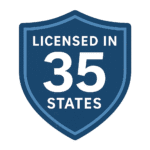South Carolina Homeowners Insurance – Your Top Questions, Answered
As licensed South Carolina agents, we’re here to make homeowners insurance simple. Owning a home in South Carolina comes with unique challenges, from hurricane season along the coast to rising property values inland. That’s why it’s essential to understand your coverage, deductibles, and the ways you can save. In this guide, we break down the most common questions our clients ask about South Carolina homeowners insurance, so you can protect your home and your wallet with confidence.
Want a personalized quote? Call or text us today and see how much you could save.
South Carolina Homeowners Insurance FAQ
Coverage Basics
What does homeowners insurance cover in South Carolina?
Homeowners insurance in South Carolina typically protects you in four main areas:
Dwelling coverage – Pays to repair or rebuild your home if it’s damaged by covered events like fire, wind, hail, or vandalism. In coastal or hurricane-prone counties, this often includes separate windstorm or hurricane deductibles. For example, a Charleston homeowner might have a 2% hurricane deductible for storm damage.
Personal property coverage – Covers your belongings, such as furniture, electronics, and clothing, if they’re damaged, stolen, or destroyed by a covered peril. If you live in a flood zone along the coast, standard homeowners insurance won’t cover flood damage, you’d need a separate flood policy.
Liability protection – Helps pay legal and medical costs if you’re found responsible for injuries or property damage to others. For instance, if a guest slips on your deck during hurricane cleanup, liability coverage could help cover their medical bills.
Additional living expenses (ALE) – Pays for temporary housing, meals, and other costs if you can’t live in your home due to a covered loss. In hurricane-prone areas like Horry or Beaufort County, ALE might cover hotel stays and meal costs if your home is uninhabitable after a storm.
If you’re unsure which coverages you need, our licensed agents can review your current policy and identify any gaps. You can request a free coverage quote here.
Is flood insurance included in homeowners policies?
No, standard homeowners insurance policies in South Carolina do not include coverage for flood damage. This is a common misconception, but floods are considered a separate peril that requires its own policy.
Flood risk in South Carolina is determined in part by FEMA flood maps, which outline different flood zones based on your property’s location and elevation. If your home is in a high-risk zone, common along the coast, rivers, and low-lying areas, you may be required by your mortgage lender to carry flood insurance.
You can purchase flood insurance through the National Flood Insurance Program (NFIP), which offers standardized coverage limits and rates set by the federal government, or through private flood insurance companies, which may offer higher coverage limits, additional living expense coverage, and sometimes lower premiums for certain properties.
Flood insurance also has its own deductible, separate from your homeowners deductible. For example, if your home in Beaufort County sustains $50,000 in flood damage and your flood deductible is $5,000, you would pay the $5,000 out of pocket before insurance covers the rest, regardless of your homeowners policy deductible.
For coastal residents, especially in hurricane-prone counties like Charleston, Horry, and Georgetown, flood insurance is strongly recommended even if you’re not in a high-risk zone. Hurricanes and tropical storms can cause storm surge and heavy rainfall that lead to flooding far inland, and without a separate policy, those damages won’t be covered.
If you’re unsure about your property’s flood risk or whether you need separate coverage, our licensed South Carolina agents can help you check your FEMA zone, compare NFIP and private options, and find the right protection for your home.
Cost & Rates of Homeowners Insurance in South Carolina
What is the average cost of homeowners insurance in South Carolina?
The average cost of homeowners insurance in South Carolina is around $2,300 per year (about $192 per month), but your rate can vary widely based on where you live, the type of home you own, and your coverage choices. Here’s a look at estimated annual premiums in different parts of the state:
Charleston – $3,100+ due to higher hurricane and coastal storm risks.
Columbia – Around $2,000, with moderate risk from severe thunderstorms and occasional tropical systems.
Greenville – About $1,750, with lower hurricane exposure but possible hail and wind events.
Factors that raise premiums:
Living in a coastal or high-wind zone.
Older homes or homes with outdated wiring/roofing.
Filing multiple claims in the past.
Low deductibles.
Factors that lower premiums:
Bundling home and auto policies with the same insurer.
Installing storm shutters, reinforced roofing, or security systems.
Living further inland or outside of high-risk flood/hurricane zones.
Maintaining a good claims history.
Taking advantage of South Carolina homeowners insurance discounts.
Your rate will be unique to your home and risk profile, so it’s always worth comparing quotes from multiple carriers. If you’d like, our licensed South Carolina agents can review your current policy and help you find ways to save without sacrificing coverage.
Why are homeowner insurance rates higher near the coast?
Lowering your homeowners insurance premiums in South Carolina often comes down to reducing your risk and taking advantage of available discounts. Here are proven strategies:
Bundle your home and auto policies – Many insurers offer significant multi-policy discounts when you package your coverage together.
Install wind mitigation features – Storm shutters, reinforced garage doors, and impact-resistant windows can help protect your home in hurricane-prone areas and may qualify you for lower rates.
Improve your roof condition – Replacing an older roof with a wind-rated or impact-resistant material can reduce your risk profile and make you eligible for discounts.
Increase your deductible – If you can comfortably afford a higher out-of-pocket amount in the event of a claim, raising your deductible can lower your premium.
Shop around at renewal – Rates can change annually due to reinsurance costs, claims history, and market conditions. Comparing quotes at renewal ensures you’re still getting the best value.
Ask about local or affinity discounts – Some carriers offer reduced rates for certain professions, community associations, or security system installations.
See if you qualify for our top-rated homeowner discounts, check your eligibility here.
Discounts & savings for homeowner insurance in South Carolina
How can I get the cheapest homeowners insurance in South Carolina?
Lowering your homeowners insurance premiums in South Carolina often comes down to reducing your risk and taking advantage of available discounts. Here are proven strategies:
Bundle your home and auto policies – Many insurers offer significant multi-policy discounts when you package your coverage together.
Install wind mitigation features – Storm shutters, reinforced garage doors, and impact-resistant windows can help protect your home in hurricane-prone areas and may qualify you for lower rates.
Improve your roof condition – Replacing an older roof with a wind-rated or impact-resistant material can reduce your risk profile and make you eligible for discounts.
Increase your deductible – If you can comfortably afford a higher out-of-pocket amount in the event of a claim, raising your deductible can lower your premium.
Shop around at renewal – Rates can change annually due to reinsurance costs, claims history, and market conditions. Comparing quotes at renewal ensures you’re still getting the best value.
Ask about local or affinity discounts – Some carriers offer reduced rates for certain professions, community associations, or security system installations.
See if you qualify for our top-rated homeowner discounts, check your eligibility here.
Claims & Repairs for Homeowners in South Carolina
How do I file a homeowners insurance claim in South Carolina?
Filing a homeowners insurance claim in South Carolina is straightforward if you follow the right steps and avoid common pitfalls. Here’s what to do:
1. Ensure safety first
If the damage is from a major event like a hurricane, fire, or storm, make sure everyone is safe and the property is secure before anything else.
2. Document the damage immediately
Take clear photos and videos from multiple angles.
Record serial numbers for damaged electronics/appliances.
Keep any receipts for temporary repairs or hotel stays.
3. Contact your insurance company as soon as possible
Most insurers have 24/7 claims hotlines or mobile apps. Provide:
Your policy number.
Date and time of the incident.
A brief description of what happened.
4. Prevent further damage
If safe to do so, make temporary repairs (e.g., tarping a roof, boarding windows) to stop additional loss. Keep all receipts, your insurer may reimburse these costs.
5. Meet with the adjuster
An insurance adjuster will assess the damage in person or virtually. Provide them with your documentation and receipts.
6. Understand the payment timeline
In South Carolina, once your claim is approved, most insurers must issue payment within 30 days, though timelines may be extended if there’s a dispute or additional investigation.
Common mistakes to avoid
Throwing away damaged items before the adjuster sees them.
Failing to report damage quickly, delays can complicate your claim.
Not reviewing your deductible and coverage limits before filing.
💡Pro tip: Keep a running home inventory with photos, receipts, and model numbers stored in the cloud. This speeds up claims and helps prove losses.
If you need help understanding your coverage or navigating a claim, our licensed South Carolina agents can walk you through the process and make sure you don’t miss important deadlines.
Still Have Questions?
Our friendly team is here to help! Whether you prefer a quick phone call, a live chat, or a personalized quote, we’ll make sure you get clear, straightforward answers. Reach out today and let’s find the coverage that’s right for you.
Last Updated on by Jayleen Ridgeway





